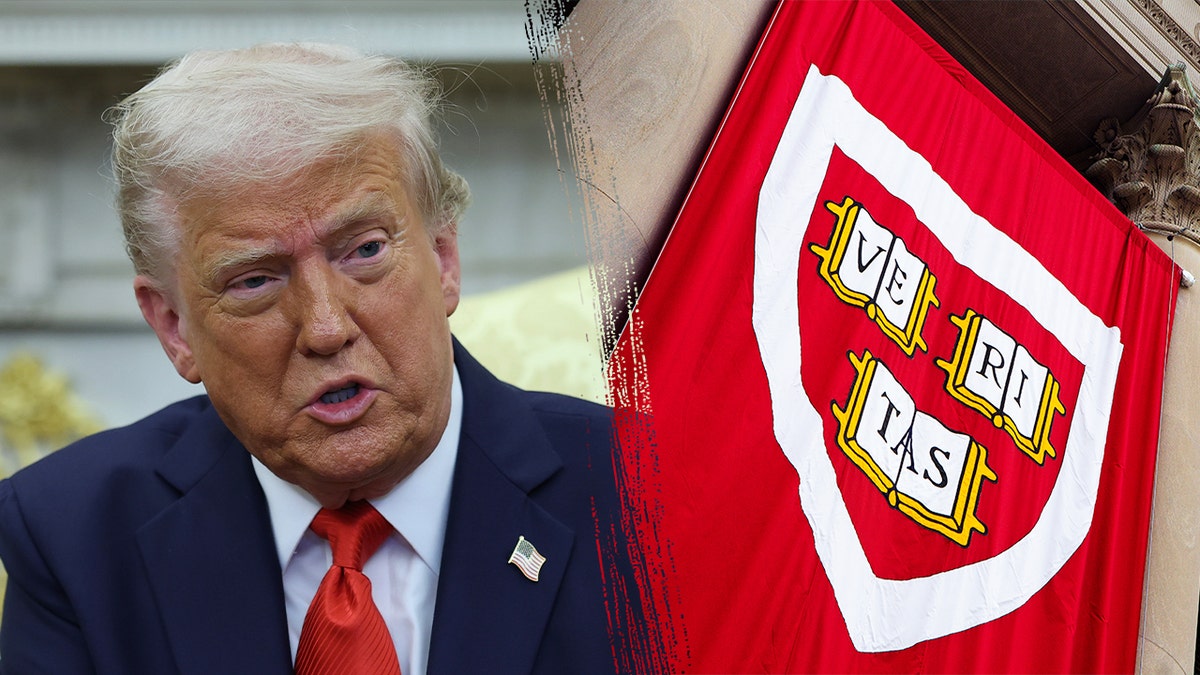Harvard And Trump's "America First": A Clash Of Ideologies

Table of Contents
Harvard's Traditional Globalist Stance
Harvard University's history is deeply intertwined with internationalism. For centuries, it has championed global cooperation, the free exchange of ideas, and the pursuit of knowledge across borders. This commitment is reflected in its structure, its faculty, and its research initiatives.
Emphasis on International Cooperation
Harvard's global engagement is multifaceted. It fosters international collaborations through numerous initiatives:
- Extensive student exchange programs: Students from all corners of the globe enrich the Harvard community, fostering cross-cultural understanding and collaboration.
- Joint research projects: Harvard faculty actively participate in international research consortia, tackling global challenges collaboratively. Examples include climate change research with international partners and collaborative medical studies involving universities worldwide.
- Global centers and initiatives: Harvard maintains numerous centers and initiatives dedicated to promoting international understanding and cooperation, focusing on areas like human rights, public health, and economic development. These initiatives often involve direct engagement with international organizations and governments.
This commitment to global cooperation underscores Harvard's belief in multilateralism and the importance of international relations in addressing complex global issues.
Promotion of Free Trade and Open Borders (Historically)
Harvard's economic policies, historically, have often favored free trade agreements and relatively open borders. This stance aligns with the university's emphasis on global economic integration and the benefits of a free flow of goods, services, and people.
- Numerous faculty members have published research and made public statements supporting free trade agreements, emphasizing their potential to stimulate economic growth and improve global living standards.
- Harvard's economic departments have consistently advocated for policies promoting immigration, recognizing its contribution to economic dynamism and innovation.
However, this stance directly clashes with the protectionist tendencies of the "America First" policy.
The "America First" Policy and its Implications
Trump's "America First" policy prioritized domestic interests above international collaborations, emphasizing protectionism, nationalism, and a more isolationist approach to foreign policy. This fundamentally challenged Harvard's traditional globalist perspective.
Trade Protectionism and its Impact on Global Partnerships
The implementation of tariffs and trade wars under the "America First" agenda significantly impacted Harvard's global initiatives.
- Trade disputes with China, for instance, impacted research collaborations and access to international markets for Harvard-affiliated companies and researchers.
- Increased protectionist policies threatened to disrupt established supply chains and hinder collaborative research projects that relied on international partners.
- The shift towards bilateral agreements, rather than multilateral ones, also posed challenges to Harvard’s efforts to foster global cooperation and address transnational issues.
These protectionist policies disrupted decades of established international collaborations.
Immigration Restrictions and their Impact on Harvard's Diversity
The stricter immigration policies enacted under the "America First" agenda directly impacted Harvard's diverse community.
- Increased scrutiny of visa applications created significant hurdles for international students and scholars seeking to study or work at Harvard.
- Concerns around the potential impact on research collaborations with international institutions and the recruitment of top talent from abroad became increasingly prominent.
- The university's ability to maintain its diverse student body, a key component of its intellectual vibrancy, was threatened.
The Resulting Conflict and Areas of Tension
The clash between Harvard's globalist values and the "America First" agenda created significant points of friction.
Funding and Research
The shift in national priorities potentially impacted funding for research projects involving international collaborations.
- Grants and funding opportunities tied to international partnerships faced increased scrutiny and potential reductions.
- Research involving international data sharing or collaborations with foreign institutions encountered increased bureaucratic hurdles.
- Access to crucial resources for research, such as international datasets and scientific equipment, could be affected by trade restrictions.
Public Discourse and Debate
The clash of ideologies fueled significant public discourse.
- Harvard officials issued statements expressing concerns about the potential negative consequences of certain "America First" policies on research, education, and international relations.
- Prominent faculty members engaged in public debates, weighing in on the implications of protectionism, immigration restrictions, and other policy changes.
- These debates often highlighted the potential long-term consequences of an inward-looking approach to foreign policy.
Long-Term Consequences
The long-term impact of this ideological clash remains to be seen, but it has the potential to significantly alter both Harvard's international engagement and the trajectory of US foreign policy. A less internationally-engaged Harvard might lead to decreased global collaboration and a less diverse student body. Simultaneously, the US may experience a decline in its soft power and its ability to effectively address global challenges.
Conclusion: Reconciling Harvard and Trump's "America First": A Continuing Debate
The fundamental differences between Harvard's historically globalist outlook and the nationalist approach of Trump's "America First" policy are undeniable. The resulting tensions highlight a crucial debate about the role of the US in the global community and the importance of international cooperation versus national self-reliance. While the "America First" approach prioritized national interests, Harvard's perspective emphasized the mutual benefits of global collaboration and the exchange of ideas.
The areas of conflict—from research funding to immigration policies—underscore the deep implications of this ideological clash. Understanding this conflict is crucial for navigating the future of American foreign policy and the role of American universities in a globally interconnected world. We encourage readers to delve deeper into the ongoing debate, exploring the perspectives of both sides and engaging in thoughtful discussions about the future of American global engagement. Further research into the impact of protectionist policies on higher education and international collaboration would offer valuable insights into this continuing debate surrounding Harvard and "America First" policies.

Featured Posts
-
 Insults Whistles And Gum The Harsh Realities Faced By Opponents At The French Open
May 30, 2025
Insults Whistles And Gum The Harsh Realities Faced By Opponents At The French Open
May 30, 2025 -
 The Elevated Risk Of Inflation And Unemployment Heightened Economic Uncertainty
May 30, 2025
The Elevated Risk Of Inflation And Unemployment Heightened Economic Uncertainty
May 30, 2025 -
 Ekstrennoe Soobschenie Ne Vykhodite Iz Doma Izrail
May 30, 2025
Ekstrennoe Soobschenie Ne Vykhodite Iz Doma Izrail
May 30, 2025 -
 Current Status Of The Measles Outbreak Across The United States
May 30, 2025
Current Status Of The Measles Outbreak Across The United States
May 30, 2025 -
 Preventing Test Drive Carjacking Safety Tips For Dealers And Buyers
May 30, 2025
Preventing Test Drive Carjacking Safety Tips For Dealers And Buyers
May 30, 2025
